Driving commercial and political engagement between Asia, the Middle East and Europe
Driving commercial and political engagement between Asia, the Middle East and Europe
Driving commercial and political engagement between Asia, the Middle East and Europe
In a new research briefing, Zhouchen Mao, Head of Research and Advisory at Asia House, and Junni Ogborne, China Advisor, Asia House, take stock of the 20th Party Congress, and its indications for China’s future policy direction.
Key insights
The 20th National Party Congress of the Chinese Community Party (CCP) started on 16 October, with the Party’s work report and the top leadership reshuffle forming the most significant elements of the quinquennial event. The report delivered by President Xi on 16 October outlined a number of key achievements in the past five years, while offering the most authoritative insights into the Party’s objectives and priorities for the next five years and beyond. Ultimately, the Party’s long-term direction and vision is to overcome current internal and external challenges to become a “moderately developed country” by 2035 and a “modern Socialist country” by 2049.
As President Xi secured a third five-year term as the Party Chief, the work report, which is considerably shorter in words than the 19th Party Congress work report, focused on continuity rather than any fundamental shifts, with policies remaining largely consistent. That said, there were new indications of the Party’s priorities.
Firstly, the focus on security is unmistakable in President Xi’s speech. The term “security” appeared some 91 times during his remarks, illustrating the Party’s growing concerns, both domestically and internationally. The ubiquity of “security” is pitched in a largely defensive stance against perceived internal and external threats. It also reflects both the importance of a holistic approach to security under President Xi1 and underscores the message of self-reliance, whereby security and development are deemed mutually reinforcing.
Secondly, on the economy, calls for “high-quality development”- which was added to the Party’s Constitution following its amendment- was identified as another key priority at the 20th Party Congress. The emphasis on “high-quality development” reflects the Party’s acknowledgement of China’s slowing economic growth. The key economic framework, Common Prosperity, appeared four times in the work report as China aims to rebalance uneven income distribution and increase the size of the middle class.
Thirdly, a new section on education and cultivating tech talent emerged, suggesting a sense of urgency in Beijing to develop skills that can drive domestic innovation and limit reliance on overseas supply chains, which could be vulnerable amid increasing geopolitical tensions. This should be viewed as a part of China’s attempt to fulfil self-sufficiency in the tech sector by boosting technological innovation, an area identified in the work report as insufficient.
Lastly, China’s foreign policy approach will be centred around fostering closer ties with the Global South amid fraught relations with the West.
As expected, President Xi was confirmed for a third five-year term as the Party’s general secretary and no clear candidate with the right combination of youth and experience was elevated to a position that would make them a viable successor at the next congress in 2027. Amendments to the Party’s constitution also built in President Xi’s signature policy ideas and the “Two Upholds” concept that reinforces the legitimacy of his rule.
The most striking sign of the extent of President Xi’s ability to personally decide the leadership appointment process came on the last day of the Congress when new leadership for the next five years was unveiled. The top-level Politburo Standing Committee (PSC) is now made up of President Xi and six officials that are close to, or were promoted by, him. The Politburo and other Party bodies, such as the military commission, discipline body, and secretariat, were also filled with President Xi’s confidantes.
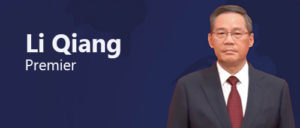 Li Qiang (63)
Li Qiang (63)
Current: Shanghai Party Secretary
Expected position: Premier
The rapid elevation of ally Li Qiang to be tapped for Premier is a break from tradition, given that he has no experience in central government. Li has spent his entire career in the prosperous coastal areas of Zhejiang, Jiangsu, and Shanghai, and is known to be relatively business oriented. In his current posting in Shanghai, he oversaw the launch of the STAR Market in 2019 and courted investment from Tesla, but was also criticised for his handling of the prolonged COVID-19 lockdown earlier this year.*
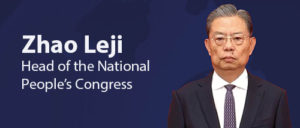 Zhao Leji (65)
Zhao Leji (65)
Previous: Chief of Central Commission for Discipline Inspection (CCDI)
Expected: Head of the National People’s Congress
Previously in charge of the CPC’s anti-corruption and disciplinary body, Zhao stays in the PSC and is promoted to be the third-ranked official. He will likely take over as head of the National People’s Congress, China’s legislature. While not a protégé of President Xi as such, both Zhao and Xi have family ties to Shaanxi province.
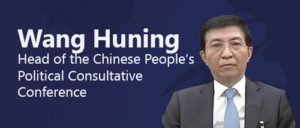 Wang Huning (67)
Wang Huning (67)
Previous: First Secretary of CPC Secretariat
Expected: Head of the Chinese People’s Political Consultative Conference (CPPCC), an advisory body
Wang, a former academic and long-time party political theorist, stays in the PSC and moves up to fourth position. Wang helped shape the Party’s ideology under three general secretaries and has been a close advisor to President Xi in developing the “China Dream” ideology and China’s foreign policy.
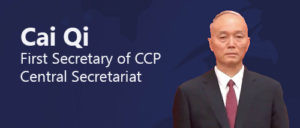 Cai Qi (66)
Cai Qi (66)
Current: Beijing Party Secretary
Expected: First Secretary of CCP Central Secretariat
Cai, a new addition to the PSC, has close ties to President Xi going back to his time in Zhejiang and Fujian province. As Beijing Party Secretary, he played a key role in establishing the Xiong’an special economic zone. In his new role as the Head of the Central Secretariat he will manage day-to-day Party affairs.
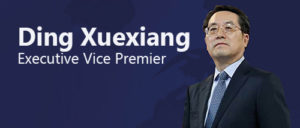 Ding Xuexiang (60)
Ding Xuexiang (60)
Current: Director of the CPC General Office
Expected: Executive Vice Premier
An engineer by training, Ding is the youngest member of the new PSC and one of President Xi’s closest aides, essentially serving as his “chief of staff” and often travelling with the Chinese leader. Ding is expected to become the first-ranked vice premier overseeing a broad economic portfolio.
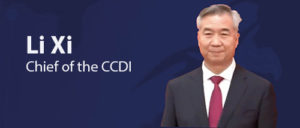 Li Xi (66)
Li Xi (66)
Current: Guangdong Party Secretary
New (Confirmed): Chief of the CCDI
Li Xi has ties with President Xi going back to the 1980s and has been rapidly promoted over the last decade. For the last five years, Li Xi has been the party chief of China’s economic powerhouse of Guangdong province. In his previous role as Party Chief of Liaoning, Li was known for his tough stance against corruption, which he is set to continue as the Party’s new disciplinary enforcer.
*https://www.scmp.com/news/china/politics/article/3196959/chinas-li-qiang-shakes-shanghai-covid-chaos-enter-communist-party-inner-circle
The Party’s work report was clear that a multidimensional approach to “national security” that straddles domains ranging from military matters to social welfare, food and energy was required. A much bigger picture is that safeguarding “national security” is increasingly seen as a high priority for Beijing’s strategy of seeking greater self-reliance to manage external uncertainties. To this end, President Xi framed “national security” as “the bedrock of national rejuvenation”2, meaning that national resources are most likely to be mobilised to withstand growing challenges and uncertainties.3 Additionally, the work report, for the first time, referenced the need to develop mechanisms to counter foreign sanctions and protect China’s national security, a concern that was further elevated following the sweeping imposition of Western sanctions against Russia. From Beijing’s perspective, similar measures could be imposed on China amid Cross-Strait tensions.4 Such concern had elicited various exercises in February this year to stress test the resilience of China’s financial system and further bolstered calls for self-reliance and self-sufficiency, with the latter appearing in the work report for the first time.
On the economic front, priorities remain consistent amid the reappearance of President Xi’s key policy frameworks of Common Prosperity and “high-quality development”, suggesting no real departure from these policies. The pursuit of “high-quality development”, which was only mentioned once at the 19th Party Congress, occupied a whole section in the current work report and is set to serve as the basis of China’s economic growth policy in the next five years and beyond. The insistence on “high-quality development” implies that the Chinese economy has shifted from high-speed growth to one that focuses on high-quality5 where the Party will prioritise optimising economic structure over headline growth figures. Though that is not to say growth is no longer important. Instead, “high-quality development” aims to increase domestic demand and enhance domestic supply chains to mitigate external shocks. In other words, the economic growth figure is not the only measuring stick, and growth will be defined by the Party’s progress in fulfilling its main priorities, including addressing inequality, achieving technological self-sufficiency, and doubling its income.
On Common Prosperity, the framework will further adjust uneven income distribution to expand the middle-income class and boost domestic consumption. The work report also signalled institutional reforms related to Common Prosperity without elaborating on the details. Interestingly, the language employed in the work report sought to reassure that wealth will not be redistributed forcibly, which was the main concern amongst domestic and foreign investors, in suggesting that the Party will “promote fair opportunities, expand the middle-income group, and fix income distribution by standardising the mechanism of wealth accumulation”. The aim of “standardising the mechanism of wealth accumulation” was the first revelation of the Party’s intention to implement measures to fix income distribution. This could come in the form of property tax or income tax reform.
While the issue of raising youth unemployment was not raised in the work report, the implementation of the “employment-first” strategy took up a new section. Like the 19th Party Congress work report, the Party’s continued emphasis on employment means that a healthy labour market and job security are perceived as major components of the Common Prosperity framework to narrow wealth disparity. It also implies that the Party recognises both the political and social instability risks associated with unemployment as the work report accentuated the Party’s concerns around stability and security.
The 20th Party Congress reaffirmed the Party’s direction in maintaining zero-COVID policy as President Xi touted the strategy’s success a political achievement, offering no timeline to end it. He also elaborated on the need to build a healthcare system capable of coping with future pandemics which implies that China lacks sufficient healthcare resources.
President Xi’s announcement came amid a series of commentaries by the state media in recent weeks that insisted on the correctness of zero-COVID, making it clear that there is no timeline for the end of this policy despite expectations of a shift away from stringent preventive measures after the Party Congress.
To support China’s modernisation and self-sufficiency drive, particularly in strategic technologies such as semiconductors, the strategy of cultivating science and tech talent underscored the importance of improving the quality of domestic training and education. President Xi described this as “the foundational and strategic pillar for building a modern socialist country in all respects”. In other words, China’s transition toward a higher income country will partly hinge on its ability to upgrade its domestic human capital and improve its competitive advantage for talent in strategic fields. The statement reinforced the Party’s aim to continue building top talent pools that could strengthen research and development (R&D) and innovation in the tech industry which in turn will improve the country’s productivity. This is not the first time that education and science were placed at the centre of the Party’s development agenda. As early as the 1990s, former president Jiang Zemin implemented programmes to turn Chinese universities into top research centres. It is anticipated that such efforts will accelerate and serve as the solution to China’s dampening economic look and its strategic dependence on foreign technology following the latest US restrictions aimed at slowing China’s ability to produce advanced chips.
President Xi’s confidence over the country’s achievements in the past five years was paired with a sobering assessment of the external environment. Worsening geopolitical tensions and business risks compelled the top leadership to not only reconfigure its growth model but also reconsider its approach to foreign affairs. A considerable shift in the foreign policy domain is the appearance of the Global Development Initiative and the Global Security Initiative that were introduced in 2021 and this year, respectively, to further strengthen ties between China and the Global South This stems from the Party’s conclusion that China’s relations with the West will remain fraught for the foreseeable future.
Broadly speaking, the work report signalled the Party’s commitment to market opening and its interests in continued economic engagement with the West. This is evidenced by claims of a “more proactive strategy of opening up” along with promises to “reduce negative lists for foreign investments” and “protect the rights and interests of foreign investors in accordance with the law”.
For businesses, President Xi’s speech at the 20th Party Congress was a major boost for industrial policy, underscored by the urgent prioritisation of security and self-reliance in the next five years and beyond. While the Party’s security-focused mindset could result in heightened scrutiny for certain companies and industries, the policy will likely create tailwinds as support is expected in areas such as the tech industry, the education sector, and health care, as well as agriculture. For instance, China routinely (re)assesses target industries to encourage foreign investment. The latest 2022 Catalogue of Encouraged Industries for Foreign Investment along with changes to the Negative List in April align with the country’s plans to attract foreign investment in high-tech, clean energy, and export-oriented sectors.
Furthermore, with food security topping the Party’s priorities at the 20th Party Congress, it offers significant opportunities for both inward and outward investments. Chinese overseas investments in agriculture in recent years have focused on international mergers and acquisitions to improve food security and sustainable food supply, evidenced by investments in agricultural technology and biotech projects by state-owned and private companies.6 Although Chinese outward agricultural investments have grown exponentially, Beijing has consistently stressed self-reliance, something amplified by the 20th Party Congress. Domestically, China has invested in agricultural technologies such as genetically modified seeds to boost production and domestic food supply. It is therefore in China’s interests to continue to encourage foreign expertise and investments in a sector that is intrinsically linked to national security.
That said, an expansive notion of “security” that permeates both traditional and non-traditional domains will most likely generate challenges for multinational corporations, particularly when it comes to compliance with stricter regulations on sensitive issues such as cybersecurity, and the potential to get caught up in sanctions as the Chinese government expands its toolkit to counter foreign measures.
Looking at new appointments to the PSC (4 of 7 members), Politburo (13 of 24 members), and Central Committee that will serve for the next five years, three trends stand out:
On the personnel front, it should be noted that the Party Congress is the first part of the leadership transition. The process will be completed at the Two Sessions in March 2023, when top government appointments, including premier, vice-premiers, and ministers, will be unveiled, with other roles expected to be confirmed in the interim.
Watch for a big turnover in China’s economic policy team – including a new top economic advisor and heads of the central bank, finance ministry, and securities regulator – as well as new ministers and vice ministers responsible for particular industries. Businesses will be eager to start engaging and building relationships with these officials once they are in post.
On the policy front, priorities in the Party Congress work report will be translated into concrete policies over the coming months and years, including steps to realise President Xi’s goals related to economic self-sufficiency, net-zero, and common prosperity. Again, the action will ramp up once the new government is installed at the Two Sessions.
Asia House provides a range of research and advisory services to help organisations meet their objectives. To find out more about China-focused advisory services at Asia House, please contact Jonathan Smith, Corporate Affairs Manager, at: jonathan.smith@asiahouse.co.uk
NOTES
1 President Xi first introduced the concept of “comprehensive national security” in 2014 which has evolved over the years to the become a core element of the Party’s policy goal.
2 https://www.bloomberg.com/news/articles/2022-10-18/full-text-of-xi-jinping-s-speech-at-china-20th-party-congress-2022
3 In the Party’s work report, President Xi warned against “black swan” and “grey rhino” events and asked official to ensure contingency plans are ready. A “grey rhino” is a term used to define risks that are slow moving, obvious but are conveniently ignored. It is opposite of a “black swan” event that is highly improbable and less predictable.
4 https://www.theguardian.com/world/2022/may/04/beijing-orders-stress-test-as-fears-of-russia-style-sanctions-mount
5 https://www.scmp.com/economy/china-economy/article/3196228/chinas-gdp-rebounded-significantly-third-quarter-state?module=inline&pgtype=article
6 https://asia.nikkei.com/Spotlight/The-Big-Story/Farming-out-China-s-overseas-food-security-quest
